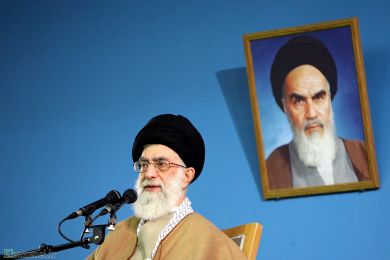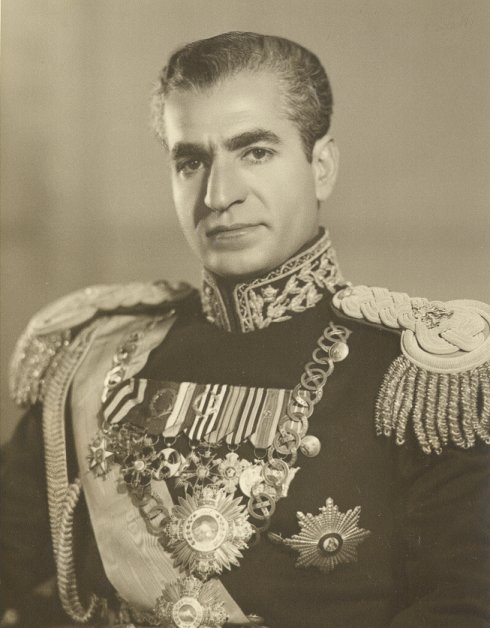
The Supreme Leader of Iran: Says its time for America
to apologize for its 'wrongdoing.'
Press TV, Islamic Republic of Iran
Ayatollah Khamenei
Says America Must Apologize for 1953 Coup
Does the United States owe the
Iranian people an apology for the 1953 CIA-sponsored coup that overthrew that
nation's democratic government? And is there any justification for the way American
diplomats at the U.S. Embassy in Tehran were taken prisoner in 1978? According
to this news account of a speech by Iran's Supreme Leader Ayatollah Khomeini, the
answers to both questions are yes - and if America's new president wants to
improve relations, he’ll have to issue an apology for America's past misdeeds.
October 29, 2008
Islamic
Republic of Iran - Original Article (English)
 Shah Muhammad Reza Pahlavi, 1919-1980. He dreamed
Shah Muhammad Reza Pahlavi, 1919-1980. He dreamed
of a resurgent persian empire, and according to some
Arab accounts, after putting him in power
courtesy of
a CIA coup, the U.S. removed him for it. (above).
[
 Shah Mohammad Reza Pahlavi
Shah Mohammad Reza Pahlavi]
[
 Dr. Mohammed Mossadegh
Dr. Mohammed Mossadegh]
Ex-Iranian Prime Minister Mohammed Mossadegh.
Arousing the jealousy of the Shah and the anger of
British oil companies, Mossadegh was removed in
a CIA-run uprising. He spent the rest of his life in
'internal exile.' Here he is in 1967. (below)
 ------------------------------------------------------------
------------------------------------------------------------
Ayatollah Khamenei has said
that the dispute between the United States and Iran is very deep-seated. The
Leader of the Islamic Revolution says that the United States must apologize to
the Iranian nation for its wrongdoing, if it wishes to have closer ties to
Tehran.
Tehran and Washington severed
diplomatic ties in 1979.
In a Wednesday address to
Iranian scholars and students, the Supreme Leader of the Islamic Revolution
asked why there is such a divide between Iran and the United States, drawing
attention to the causes for the Iran-America conflict. "In order to answer
this question we must deeply reflect upon the issue. That's because the
conflict goes beyond differences of opinion on certain political issues - and
relates to how the victory of the Islamic Revolution put an end to U.S. control
over its main foothold in the oil rich Middle East region.
His Eminence added: "After
Americans were expelled, they resorted to their usual arrogant policies and
began using their embassy in Tehran for espionage activities against the
Islamic Republic. But the great movement of our faithful youth - who were true
followers of Imam Khomeini, foiled their plots."
Speaking six days before the
U.S. presidential election, the Leader said that Iranian "hatred" toward
the White House is a result of America's plots against the people of Iran over
the past 50 years.
Iran holds the United States
responsible for a CIA-launched coup in 1953, against the then-democratically
elected Prime Minister Mohammad Mosaddeq. The coup marked the CIA's first
successful overthrow of a foreign government, after which the United States
restated its close ally the Shah, Mohammad-Reza Pahlavi, in Iran.
Ayatollah Khamenei said it
was disappointing that American politicians have never expressed regret over
their past anti-Iran actions. "Instead, they continue to adopt the same
arrogant attitude," the Leader said.
He added: "The victory
of our nation's Islamic movement, under the leadership of Imam Ayatollah
Khomeini and the annihilation of the powerful fortress of arrogance inside the
country was due to the sense of responsibility of our youth. It was this sense
of responsibility that led to the resistance and the miraculous victory of the
Iranian nation over the arrogant powers during the eight-year Sacred Defense
Era [1980-1988]."
Posted by WORLDMEETS.US
His Eminence said that the
capturing of the U.S. Embassy - which was a center for espionage - on November 4,
1978, was the result of the collective sense of responsibility on the part of
the prominent youth of the time.
American Democratic
presidential nominee Barack Obama has pledged to directly and diplomatically
engage with Iran should he take office, raising the prospect of closer Tehran-Washington
relations. But according to Senator Obama, diplomatic methods would only be used to
address Iran's nuclear program.
According to former U.S. Secretary
of State Madeleine K. Albright, America's declaration of war against democracy
in Iran in 1953 played a pivotal role in troubled relations between the two
countries. "It's easy to see now why many Iranians continue to resent this
intervention by America into their internal affairs," Albright said in a
March 2000 address.
Ayatollah Khamenei said that
since the victory of the Islamic Revolution, the United States has adopted a
hostile attitude toward Iran in the hopes of isolating the country and forcing
it to crawl back to America's sphere of influence. But the Leader added
that maintaining a similar policy toward Iran will not work, particularly after the
incumbent U.S. President [Bush] has driven his country into crisis.
[Posted by
WORLDMEETS.US October 29, 9:55pm]